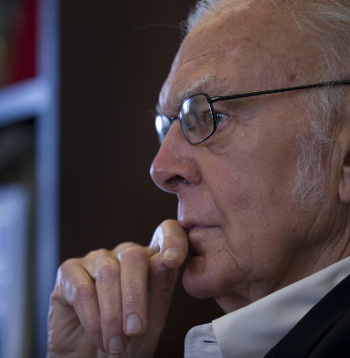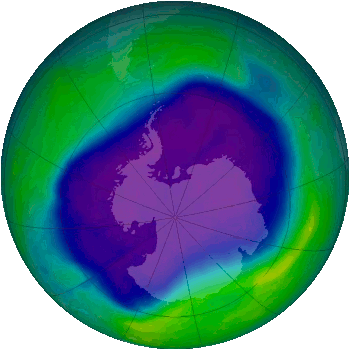
F. Sherwood Rowland
March 15, 2012 I once attended a conference in Montreal, Quebec, Canada, where I enjoyed a McDonald's quarter pounder, avec du fromage. Those were the days! I still attended international conferences, and I could eat red meat, too! Montreal is a lovely city. It was the host of the 1976 Summer Olympics, which occurred just a few years before my 1982 visit to attend the 18th IEEE International Magnetics Conference. It was also host to a very important 1987 meeting, the product of which was the Montreal Protocol. The Montreal Protocol regulated the manufacture of ozone-depleting substances, specifically certain chlorofluorocarbons (CFCs). As a good example of the principle of unintended consequences, the chemicals responsible for our Styrofoam coffee cups, and the cool offices in which we drink our hot coffee, were found to remain in the atmosphere for many years and react with ultraviolet radiation from the sun to produce free chlorine atoms. The unfortunate consequence of this is that each of these chlorine atoms can catalyze the transformation of many thousands of atmospheric ozone molecules (O3) into oxygen (O2),Cl + O3 -> ClO + O3The problem with this ozone depletion is that our atmospheric ozone protects us from the ultraviolet radiation (UV-B) that causes skin cancer and cataracts, and also damages plants. Eventually, it was shown that seasonal holes in the ozone layer were found to form, which was alarming enough for the non-scientists to believe in what scientists were saying, and such chemicals are now regulated. As could be expected, the producers of CFCs claimed that the science was wrong, there wasn't any problem, and they should continue with business as usual. Parallels to tobacco regulation and global warming are not hard to find. The science, however, was irrefutable, and it led to the award of the 1995 Nobel Prize in Chemistry to Mario J. Molina and Frank Sherwood Rowland; and also to Paul J. Crutzen for his demonstration of the similar damaging effects of nitric oxide. I'm reminded of Linus Pauling's campaign against open-air nuclear testing in the 1950s that won him the 1962 Nobel Peace Prize. Frank Sherwood ("Sherry") Rowland died on March 10, 2012, at age 84.[1-11]
ClO + O -> Cl + O2
O3 + O -> 2O2
 | F. Sherwood Rowland June 28, 1927 - March 10, 2012. (University of California, Irvine, image by Steve Zylius). |
 | The Antarctic ozone hole, as determined by NASA satellite observations, September 24, 2006. blue and purple colors are where there is the least ozone. (Via Wikimedia Commons). |
"Is it enough for a scientist simply to publish a paper? Isn't it a responsibility of scientists, if you believe that you have found something that can affect the environment, isn't it your responsibility to actually do something about it, enough so that action actually takes place? If not us, who? If not now, when?"[1,5]Rowland taught freshman chemistry at Irvine until he was 80, maintaining an office in a building that was named in his honor.[1,6] He had 425 career publications,[1] was elected to membership in the National Academy of Sciences in 1978, and he served as its foreign secretary from 1994-2002.[11] Rowland was a part of the study of the aftermath of the Deepwater Horizon oil spill.[6] Rowland was a modest man. Ralph J. Cicerone, President of the National Academy of Sciences, recalled that when Rowland was asked about his feelings at winning the Nobel Prize, Rowland said that when you make a big discovery, it means that either the other guy was wrong, or he missed something important. How do you think that makes them feel? [9] Rowland's wife, Joan, has asked that donations be made to the F. Sherwood Rowland Chair and Graduate Fellowship Fund of the UC Irvine Department of Chemistry.[1] Said Kenneth Janda, Dean of Physical Sciences at Irvine,[1]
"He saved the world from a major catastrophe: never wavering in his commitment to science, truth and humanity, and did so with integrity and grace."
References:
- Janet Wilson, "UCI Nobel Laureate F. Sherwood Rowland has died at 84," University of California at Irvine Press Release, March 11, 2012.
- Daniel Cressey, "Sherwood Rowland, colossus of atmospheric chemistry, dies," Nature News Blog, March 12, 2012.
- Felicity Barringer, "F. Sherwood Rowland, Cited Aerosols' Danger, Is Dead at 84," The New York Times, March 12, 2012.
- T. Rees Shapiro, "F. Sherwood Rowland, Nobel Prize winner, dies at 84," Washington Post, March 12, 2012.
- Eyder Peralta, "F. Sherwood Rowland, Who Warned Of Thinning Ozone, Has Died," NPR, March 12, 2012.
- Stephen Miller, "Sherwood Rowland 1927-2012 - Chemist Discovered Threat to Ozone Layer," Wall Street Journal Online, March 12, 2012.
- Sherwood Rowland, Telegraph (UK), March 12, 2012
- Ozone pioneer Rowland dies at 84, BBC News, March 12, 2012.
- Shari Roan (Los Angeles Times), "Obituary: F. Sherwood Rowland / Nobel winner who warned of CFCs' danger to ozone," Pittsburgh Post Gazette, March 13, 2012.
- Mario J. Molina and F. S. Rowland, "Stratospheric sink for chlorofluoromethanes: chlorine atom-catalysed destruction of ozone," Nature, vol. 249, no. 5460 (June 28, 1974), pp. 810-812.
- Nobel Laureate and NAS/IOM Member "Sherry" Rowland Has Died at Age 84, National Academy of Sciences Press Release, March 12, 2012.
- Daniel Cressey, "Sherwood Rowland, colossus of atmospheric chemistry, dies," Nature News Blog, March 12, 2012.